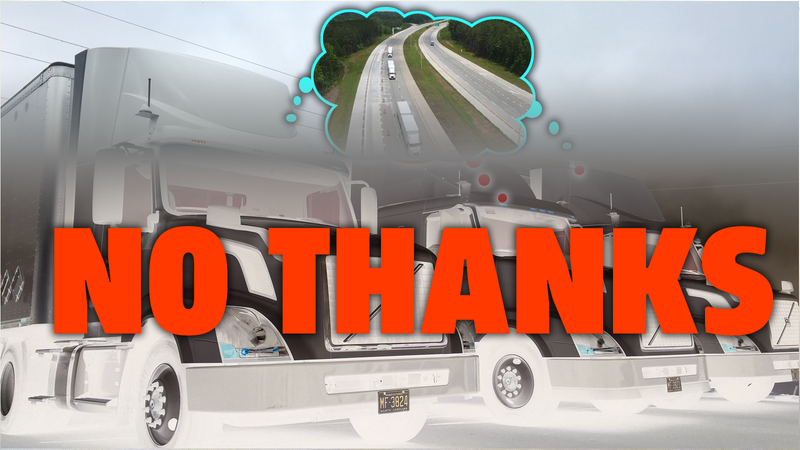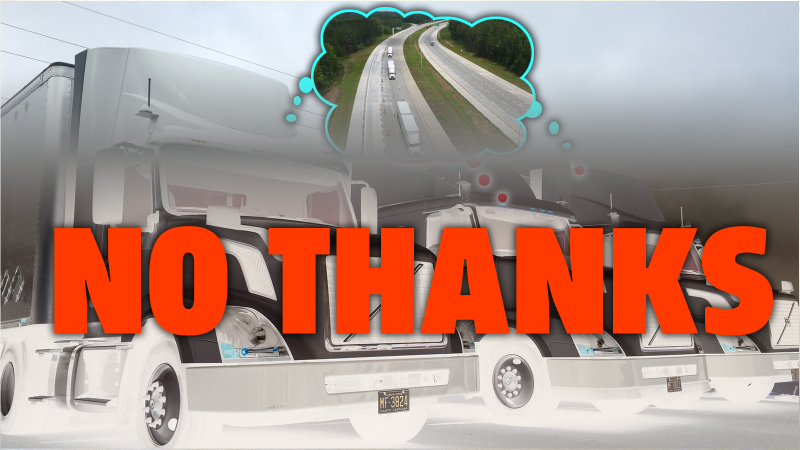
 Truck YeahThe trucks are good!
Truck YeahThe trucks are good!Remember the truck platooning? It was supposed to be the Next Big Thing in trucking—basically, one lead truck could control a string of trucks behind it, which could form a sort of electronically-connected road train—but now it seems that the real-world benefits aren’t materializing, and many of the big players are rapidly losing interest.
I’ve actually seen a live demonstration of truck platooning in action, and while it wasn’t exactly thrilling, it did seem to work generally okay. Trucks following close behind one another, with, say, a 1.5 second stopping distance between one another, can see fuel economy gains of around five percent.
If you tighten the convoy up to a one second stopping distance, you can see gains of up to 10 percent, which, for a fleet of 18-wheelers, can be pretty significant savings.
The problem, though, is the same thing that causes problems with almost every new idea: the big stupid real world. Platooning with a one second stopping distance between trucks, for example, only really works if you can be certain that the brake pad wear and overall maintenance of the following trucks is close to the same state as the lead truck. If you’re trying to platoon trucks from different fleets, that is by no means assured, and difficult to evaluate.
Advertisement
Trucks.com spoke with Dave Jackson, the chief chief executive of Knight-Swift Transportation Holdings Inc, the largest truck for-hire carrier in America, and he described the issues facing platooning very pithily as
“Platooning expects an inconsistent world to act consistently.”
As someone who’s lived in this inconsistent world for years, I can confirm Jackson’s assessment. The world is not always consistent.
Advertisement
When a platoon of trucks encounters one of the real world’s inconsistencies and has to temporarily break the platoon, then the benefits of that platoon begin to erode. Jackson told Trucks.com that even breaks of as little as 15 or 20 minutes can negate any of the fuel economy benefits of the platoon, and if you consider that these platoons will be on public highways with cars potentially driving between them to pass, then the likelihood of a 15 to 20 minute break over the course of a many-hour drive hardly seems unlikely.
Big players like Diamler Trucks, which owns Freightliner, are abandoning their platooning development because, as Martin Daum, head of Diamler Trucks told Trucks.com,
“The technology we would have to put in does not quantify the savings.”
For general-purpose trucking, platooning looks like it may just not work. If various trucks are expected to find other trucks on the road to platoon with, there’s just too many variables in truck weight, condition, maintenance, mechanical design, and so on to make ad-hoc highway platooning seem viable.
Advertisement
Some companies are sticking with it, like Volvo and Peloton, and there are certain contexts where it could make sense, specifically if all the trucks from the platoon are as close in design and specifications and maintenance as possible, and are traveling together to the same destination on the same route anyway.
The Army will be testing automated platooning this year, with 60 platooning-capable trucks to be delivered to forts for testing. That’s a context that makes sense, since they’re standardized trucks maintained by the same organization, and by having just the lead truck doing the driving, soldiers in the other trucks can focus on other issues, like making sure they don’t get blown up.
Advertisement
This is just another reminder that autonomy-related technologies, even ones as comparatively simple as truck platooning—are non-trivial problems, mostly because the world is such a chaotic place.
To help ease your mind about the chaos of the world and trucking, please take a moment to enjoy this video of the song Convoy:
10-4, good buddy.















